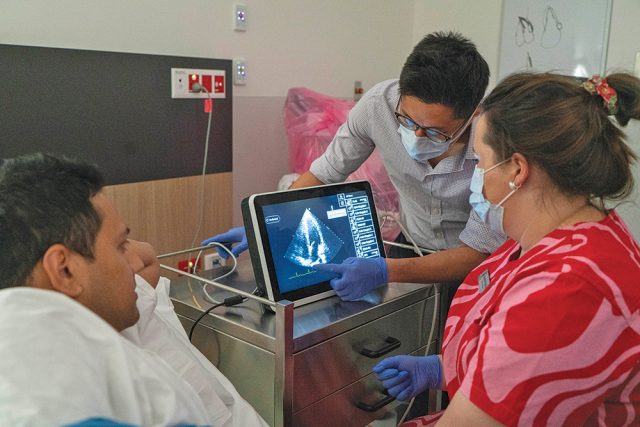Artificial intelligence (AI) has become a hot button topic in recent years, with ChatGPT being used to write everything from school essays to movies, and incorporation into autonomous driving technology on the horizon. It’s no surprise that its power is infinite, but now, it’s well and truly being harnessed for good.
In a research trial currently underway at Nepean Hospital, alongside the Baker Heart and Diabetes Institute in Melbourne, AI is being used to help train healthcare workers in rural and remote regions to perform sophisticated echocardiograms – more commonly referred to as an ultrasound of the heart.
According to Dr Faraz Pathan, cardiologist and cardiovascular imaging specialist at Nepean Hospital, the trial could be instrumental in ensuring improved accessibility for patients, and enhanced education for staff.
“From Woollahra to Walgett, Bondi to Bourke, Darling Harbour to Dubbo, we understand that there are health disparities for urban and regional areas,” Pathan said.
“We’re proud to take up the challenge to upskill and empower colleagues in rural and remote regions to bridge the gap and create better health outcomes for all.”
As part of the trial, AI is programmed into a sonography machine, which guides clinicians as they place the ultrasound probe in an optimal position to capture the best possible image of a heart.
PhD student Christopher Yu, who is leading the trial at Nepean Hospital, is hoping that it can provide earlier diagnosis, treatment and better outcomes for patients who would otherwise travel hours just to be seen.
“AI isn’t going to replace clinicians any time soon. It’s a tool we can use to help support the care we provide and extend it to communities who are challenged in accessing vital health services, bringing heart care closer to home,” he said.
“Our trial has seen us train nurses from Walgett in the state’s north. We provide them the tools and the expertise to take this AI powered machine away and bring it back to their hometown to independently perform.”
Melissa Nathan from Walgett Aboriginal Medical Services was one of the first clinicians to receive training at Nepean Hospital, and has welcomed the trial.
“We see a lot of chronic and complex clients who are afflicted with cardiac, diabetes and renal problems. Performing a procedure like this is well beyond the normal scope of services here at Walgett,” she said.
“The technology is very intuitive and lets us know how we can perform the task better to get the desired results.
“Once everything is captured it gets sent to a cloud-based server for a specialist to then interpret.”

Cassidy Pearce
Cassidy Pearce is a news and entertainment journalist with The Western Weekender. A graduate of the University of Technology Sydney, she has previously worked with Good Morning Macarthur and joined the Weekender in 2022.

